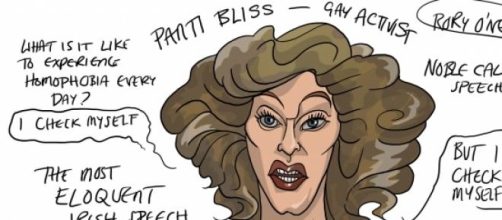The 62% vote in favour of gay marriage in Ireland is a splendid result and a further step towards making homosexuality acceptable. This will be a two-part article about my assessment of the vote in Ireland; while the Irish vote is groundbreaking, it is not as simple as it appears.
On the one hand, this is a vote that endorses the activism of people like drag queen Panti Bliss, who has spoken out forcefully about homophobia, but on the other hand, it is also an anti-clerical statement as the Catholic Church has come under scrutiny and been seen to have feet of clay.
An aggressive Church, pontificating about politics and public morals, a Church riddled with Jansenism, which had regarded Ireland as its own private fiefdom since 1922, has been brought squealing for absolution to its knees. Frankly, at this time, whatever the Church commanded would be opposed: the Prelates told their people to vote "no" and the people defied them. (what can a Church do when Bono leads the rebellion?) A priest-ridden Society has broken free.
The role of the priest has changed. In the past, many families in Ireland would have been proud to say that they had a member who was a priest or a nun, but nowadays, in the gathering mood of National clerical disgrace, they are likely to point to the family member they know to be gay instead.
In some cases, the person who today stands up to be counted as gay would yesterday have gone off to a life in the Church anyway. Growing up around priests and nuns, indeed having been a monk myself, it is my opinion that homosexuality is common, however suppressed or closeted the sexual identity might become. So, Ireland has given people options: to speak more openly and that is wondrous.
But I think Ireland has gone beyond the negatives. They have dealt with a general distrust of the Church, and a disappointment in so many of its clergy, be they cruel nuns or predatory priests. So, many of my friends in Dublin today profess to be non-Catholics, or former Catholics, titles that once would have involved the word "lapsed." It is no longer the laity who feel the stigma of being "lapsed", of "failing" in some sense.
It is the Church itself which has lapsed. It has been dragged in shame through the courts. Its position has been taken over by a rise in secularism, and I hope also by a rise in generosity. Certainly, there was a spirit in Ireland last week of toleration and a readiness to embrace what was different. A contrast to the clerical repression and bullying that typified the Ireland of the 1970s. But I worry because an institution that was so powerful cannot easily be replaced by a "mood."
Meanwhile, the impression given is that the Irish have become a nation dedicated to Theological debate on this issue. Religious doctrine can be hard to decode. One church, for instance, permits divorce while another rejects it absolutely.
You will find people vigorously telling you what Jesus said about divorce - but he said nothing about homosexuality. There are still people ready with the quotations, though.
I intend in the next part of this article, to look at the Papal statements and to see the Irish vote in the broader European context.

